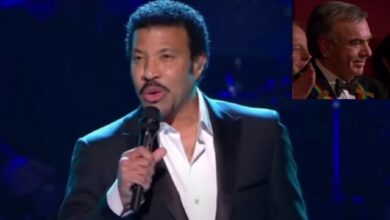Eddy Arnold And LeAnn Rimes Delivered A Remarkable Yodeling Showdown In Their “Cattle Call” Performance
Cattle Call,” a quintessential classic in the country music genre, was first recorded by Eddy Arnold in 1944. This song stands out for its distinctive Western swing sound and its unique feature: the cowboy’s “cattle call” yodel. Arnold’s rendition of the song not only exemplified his smooth vocal style but also highlighted his exceptional yodeling technique, which became a hallmark of his musical identity. The harmonious interplay of vocals and instrumentation in “Cattle Call” presents listeners with an experience that goes beyond mere entertainment; it immerses them in the rich tapestry of cowboy life and the open landscapes of the American West.
Arnold’s version of “Cattle Call” quickly gained popularity, reaching the top of the Billboard Juke Box Folk Records chart in 1945. His success bore witness to an era when country music was finding its footing on the national stage, and “Cattle Call” became emblematic of this transition. The song’s lyrics vividly paint a picture of a cowboy’s daily life and his interaction with his cattle, encapsulating a way of life that was both romanticized and rooted in reality. The memorable refrain, featuring Arnold’s yodeling, not only showcases his vocal prowess but also affirms the song’s authenticity and appeal, helping solidify its place in the annals of country music history.
The Western swing influence in “Cattle Call” reflects a style that was exceedingly popular during the 1940s, combining elements of jazz and swing with traditional country sounds. This fusion represented a significant stylistic movement that allowed for greater complexity and dynamism in country music. Arnold’s smooth vocal delivery, paired with rhythmic yodeling, created a sound that was both soothing and engaging, effectively capturing the essence of the cowboy experience. The way he conveyed the bond between the cowboy and his herd through music fostered an emotional connection that audiences found relatable and profound.
Over the years, “Cattle Call” has been covered by numerous artists, each bringing their interpretation to the classic tune. Notably, Elvis Presley included a version of the song on his 1969 album “From Elvis in Memphis.” Presley’s rendition introduced this timeless piece to a new generation of listeners, showcasing his unique ability to traverse different musical genres while honoring traditional roots. The inclusion of “Cattle Call” in his repertoire contributed to the song’s lasting relevance and popularity, demonstrating the song’s versatile nature and its ability to resonate across various musical styles.
The influence of “Cattle Call” extends beyond its original recording and subsequent covers. Today, it stands as a staple in the country music repertoire, frequently performed at live shows and celebrated for its nostalgic value. As a tuneful homage to the cowboy life, its catchy melody and heartfelt lyrics evoke compelling imagery of the American West, conjuring feelings of freedom and adventure. Each performance of “Cattle Call” embodies a sense of tradition while inviting new listeners to appreciate the beauty of cowboy culture.
Eddy Arnold’s impact on country music was profound, and “Cattle Call” remains one of his most enduring contributions. Arnold, often hailed as the “Tennessee Plowboy,” enjoyed a prolific career that was characterized by numerous hits and a pioneering role in shaping the country music landscape. His unique blend of smooth vocals, yodeling, and vivid storytelling helped define the sound of mid-20th-century country music, creating a rich and welcoming sound that appealed to a broad audience. Arnold’s approach set a precedent for future generations of artists, one that prioritized authenticity and emotional engagement.
The legacy of “Cattle Call” serves as a reflection of Arnold’s artistry and the broader cultural fascination with the cowboy archetype in American folklore. As country music has evolved, the essence captured in “Cattle Call” continues to resonate, reminding listeners of the genre’s rich history and its ability to articulate the American experience. In more recent years, the resurgence of traditional country sounds has brought renewed attention to classics like “Cattle Call,” highlighting the enduring appeal of well-crafted storytelling wrapped in melodic charm.
Indeed, the song’s continued popularity is a reminder of the timelessness of classic country songs and their cherished place in the hearts of music lovers. The emotional depth and storytelling quality of “Cattle Call” invite repeated listening and appreciation, transcending the boundaries of time and cultural shifts. It is a song that, much like the cowboy life it portrays, embodies a spirit of resilience and connection to the land, making it a pertinent testament to the universal themes of love, duty, and nature.
As artists from various genres continue to draw inspiration from classic country music, the legacy of songs like “Cattle Call” persists. It influences not only contemporary country artists but also musicians across genres who seek to connect with their roots. The ongoing celebration of Arnold’s work and the classic elements embodied in “Cattle Call” encourages both nostalgia and innovation, allowing a new generation to explore the historical and cultural significance of this musical journey. Each time “Cattle Call” is performed or recorded, it breathes new life into a proud tradition, ensuring that the spirit of the cowboy and his connection to the land endures in the fabric of American music.





